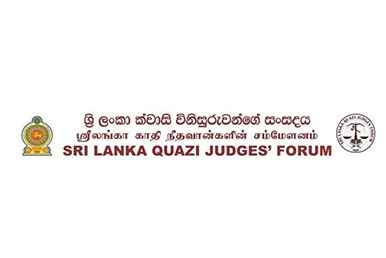The Quazi Judges of Sri Lanka have written to newly appointed Chief Justice Preethi Padman Surasena, extending their congratulations while also seeking an urgent audience to address a series of long-standing and unresolved issues affecting the Quazi Court system.
In a letter sent by registered post and signed by M. Ifham Yehiya, President of the Sri Lanka Quazi Judges Forum, the Quazis commended the Chief Justice on his elevation as the 49th head of the judiciary. While expressing their best wishes for his leadership, they also underscored the pressing need to resolve key challenges that have hampered the effective delivery of justice under Muslim personal law in the country.
The letter highlights that there are currently 65 Quazi Judges appointed across Sri Lanka by the Judicial Service Commission (JSC), yet their concerns have remained unaddressed despite previous appeals to former Chief Justice Priyantha Jayawardena, former Justice Minister Ali Sabry, and the JSC itself. The Quazis noted that their earlier proposals had been met with silence and inaction, prompting this renewed call for intervention.
Among the concerns raised, the Quazis pointed out that several Magistrates’ Courts are unaware of existing JSC circulars regarding the enforcement of maintenance payments. In some instances, applicants have been wrongly summoned to court or even subjected to arrest warrants, contrary to established procedures. Furthermore, delays in transferring cases to Special Quazis—often taking two to three months—have led to justice being delayed and the blame being unfairly placed on Quazi Judges themselves.
The letter also called attention to the hardship faced by women during appeal processes. In cases involving divorce or maintenance under appeal, the Board of Quazis often fails to order interim maintenance payments, leaving vulnerable women and children without financial support for extended periods. This, the judges argue, creates a gross imbalance, allowing male parties to move on while female parties suffer economically and socially.
Another key concern is the lack of ongoing professional training. The judges said they have only received four refresher programs in the past ten years and proposed that the Quazi Judges Forum, in collaboration with the JSC, be authorized to conduct training and orientation sessions. They offered to provide course coordinators while requesting that the JSC support logistics such as lecture halls, fees, and certification.
In addition, the Quazis highlighted the lack of official identity cards since 2008 and inadequate monthly allowances of Rs. 7,500 for judges and Rs. 6,250 for secretarial work. They appealed for a revision of these allowances, including a travel allowance, citing the rising cost of living and the strain on their ability to perform judicial duties effectively.
The letter concluded with a request for a personal meeting with the Chief Justice to discuss these matters in detail. The judges expressed hope that under his leadership, long-neglected issues would be resolved and the dignity and effectiveness of the Quazi system would be restored for the benefit of vulnerable communities across Sri Lanka.



